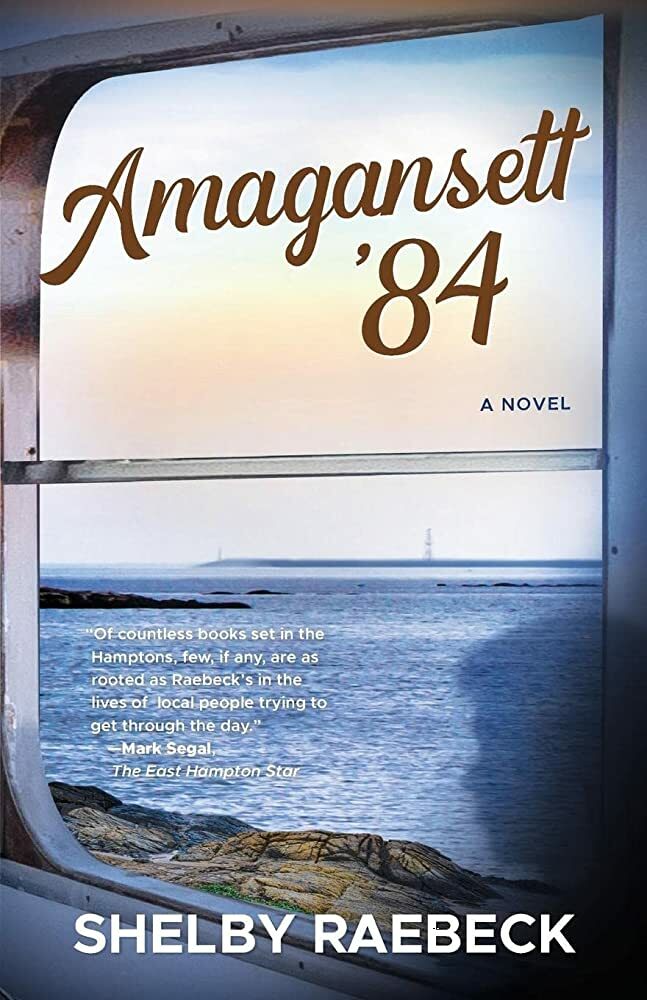
“Party School” by Jon Hart, a debut novel, and “Amagansett ’84’” by long-time local writer Shelby Raebeck, though totally different in subject matter and style, have two relatively rare, but admirable, features in common: They both basically address adolescent boys of high school age, arguably the most challenging group to get to read novels. And they both separately take on timely, significant themes not usually found in YA fiction — Hart delving into class-oriented insecurity, peer group tensions, feelings of inadequacy; Raebeck into domestic crises, race relations on the East End, suicide. In both, basketball figures as an outlet and a skill, a consolation for loners and a way into community by way of team spirit. Both books are narrated by older teenage boys.
In Hart’s book Dylan Mills, a high school senior, a nice guy of average intelligence, is aware of his outsider status in a wealthy hamlet. Unlike his classmates, he has to work. The love of his life, though, is the beautiful, privileged, controlling Rosemary, who obviously senses in Dylan an authentic human being, but she will soon be off to an “in” school. Hart’s prose — smooth, colloquial, simple, often funny or ironic, suits Dylan, a nervously self-correcting, passive but accurate observer of his feelings and surroundings. As the book’s opening sentence puts it, “No biggie. I was at another party I didn’t want to be at.” But he’s there because of Rosemary: “High school kids. What do they know? High school kids with money. Yeah, they have it figured out because they never had to figure it out.”
The story covers six months, August to January, from Dylan’s acknowledgment that he will be going to a college up north called North South, to his settling in there. The name reflects the college’s change from decades earlier when two community colleges combined to be one and got a reputation as a party school, a “haven for fools” and “a safety school for a safety school.” Its orange logo is each word, spelled in caps, with an arrow pointing up for N, and down for S. Duh. When Dylan gets there he cannot connect with the other students or those who live in the nearby area. He’s embarrassed to admit that, even for him, it’s his first encounter with a man or woman in overalls. He knows a college-ranking magazine has selected the school as one of the best colleges in the country — for weed. His parents, though, recently divorced but increasingly amicable with one another, are supportive of him, and he, in turn, is a loving, dutiful son. But he drifts. His room is a closet, his floor mates odd. He feels like an outsider, but after observing him shooting baskets alone, Tattoo Kid invites him to join the basketball team. His first response is that he doesn’t play. “I have chronic irritable bowel syndrome that sets in when I run on concrete,” he tells him.
Eventually, however, after he goes to a party in room 420 — which turns out to be 402 — he finds himself initiated into weed, beer and more oddball people with whom he gets along. There’s also a girl basketball player he’s been watching on the court.
Needless to say, Dylan eventually fits in, especially with an eccentric older local who shows up for classes, and he becomes an acolyte of a revered, radical English professor whose mantra is: “Don’t complain! Don’t criticize! MAKE IT BETTER.” He comes to recognize and value true friendship and becomes a solid student. “Party School” is a charming story that may likely appeal to OAs as well as YAs. And would you believe, not an “f” word in sight?
In “Amagansett ’84,” however, f-words and others are on full display, authentically so, because Raebeck’s looking closely at the working-class lives of Black and white kids who live in areas hardly noticed by Hamptons beach reads and literary and artistic histories. Among these sections is Freetown, north of East Hampton Village, off Three Mile Harbor Road, where, after 1827, freed slaves and Native Americans were allowed to live in small houses and trailer parks — and Black residents still do. Raebeck knows these areas, as well as the local joints that attract the old-time Bonackers and Poseys in Springs, Amagansett and Lazy Point — the bars and up-island joints these tired, often volatile or burned-out working stiffs frequent.
The year is 1984, except for a brief epilogue set in 1996. The voice of the young narrator, Ricky, 16, captures what life was like 40 years ago when locals with roots going way back, many of them fishermen, settled and tried to live out a dying and dangerous industry. Raebeck, who grew up in Amagansett, knows the local scenes then and now, especially in the off season, when the people, largely taciturn, worn out, still love a region that is being changed by new money. They’re stuck and domestic tensions that would grind them down become exacerbated, with physical and verbal violence. Especially the young who feel aimless or trapped.
Ricky, smart and sensitive, sees what’s happening but cannot stop impending tragedy. Known as Cool Motion, a nickname given him by Lance, a hip Black teen his age who admires Ricky’s expertise (plays like a brother) and friendship. But home life for Ricky is tense: his mother is dead from cancer, his indifferent father has quickly remarried and his two sisters are deeply troubled. Terse, slangy referential, ear-perfect exchanges between Blacks and whites as well as beautifully rhythmic landscape descriptions continue to show Raebeck as a fine reader of the conflicted emotions of youngsters whom life seems to pass by. The operative word is “seems.”
And, like Hart’s book, this moving story will also appeal to adults.”